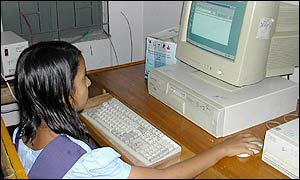| NEWS | SPORT | WEATHER | WORLD SERVICE | A-Z INDEX | ||||||||
|
| You are in: Technology | ||||||||||||||||||||||||||||||||||||||||||||||||||||||||||||||||||||||||||||||||||||||||||||||||||||||||||||||||||||||||||||||||||||||||||||||||||||||||||||||||||
|
Sunday, 6 October, 2002, 11:25 GMT 12:25 UK
Wireless web reaches village pupils

Shahsana: Wants to be a doctor
She is one of the 500 children at the Roverpally primary school, 41 kilometres north of the capital Dhaka, who can use a computer for free. Even at her young age, she knows computers can make a difference in her life. "I can learn mathematics with the computer. If I have any problem with my English, the computer can solve it. The computer can do lots of things," she said. "I want to be a doctor in the future. And I think doctors need to use computers a lot." Slow going Bangladesh has 15,000 schools. But for most of the pupils, the closest they will get to a computer is a picture in a magazine. But the country's largest non-governmental organisation, Brac, is trying to change all this by putting computers in rural schools. "Why should the technology be confined to the cities?" asked Brac's Tajul Islam. "We are all Bangladeshis. All opportunities should be available to all." Brac runs a network of 650 school libraries in rural Bangladesh.
Three years on, it has been a slow process. So far just 60 libraries have computers and they can barely cope with the interest from the pupils. At the Roverpally school, five students share a computer for 45 minutes a week. The rest of the time, they are taught computing theory. "This is the age of the computer," said the headmaster Mohammed Abdus Sabur. "Learning computers has been the greatest thing for children in my school because we didn't have the funds to buy computers ourselves." Setting up computer centres in the libraries is an expensive business, with the computers costing US$2,000 each. The situation is complicated by unreliable electricity supply and the high humidity. The government recognised the importance of training the next generation to use computers. But its plan to get computers in every school has faltered. "They are trying to make information communication technology a priority, particularly in light of the software industry in India," said internet commentator Partha Pratim Sarker of the Bytes For All technology website. "They see this can also be an industry for Bangladesh." Connected school At the Roverpally school, the three computers are fenced off in a glass booth in a corner of the library.
"With this game they learn how to get a good score and they are getting comfortable with the mouse," said librarian Selina Akhter. When they are older, they can hope to learn about the web. The school is the first one to be hooked up to the internet in a trial project, so that children can browse the net and send e-mails. It connects to the net over a wireless link to Brac headquarters in Dhaka, as this is cheaper and more reliable than using the telephone network. "Although the children might not totally understand how the internet works or be able to read the newspaper on the screen, I read it to them and they can look at the pictures," said Ms Akhter. 'Key to the future' The school library is the only place in the village connected to the internet.
Farmers can also use the internet to check crop prices and find out, for example, that they would get 10 times as much if they sold their pineapples in Dhaka than at the local market. Roverpally is the only Brac school library online. The organisation is treading cautiously as it wants to see it works before providing similar opportunities to other pupils. "This technology is key to their future," said Brac's Tajul Islam. "They are getting information, reading material we cannot provide. They can browse the world. "The windows to the world have been open to the students of Bangladesh."
|
See also:
16 Aug 02 | Country profiles
06 Jun 02 | Business
13 May 01 | South Asia
Internet links:
The BBC is not responsible for the content of external internet sites Top Technology stories now:
Links to more Technology stories are at the foot of the page.
|
||||||||||||||||||||||||||||||||||||||||||||||||||||||||||||||||||||||||||||||||||||||||||||||||||||||||||||||||||||||||||||||||||||||||||||||||||||||||||||||||
|
Links to more Technology stories |
 |
|
|||
| ----------------------------------------------------------------------------------
To BBC Sport>> | To BBC Weather>> | To BBC World Service>> ---------------------------------------------------------------------------------- © MMIII | News Sources | Privacy |